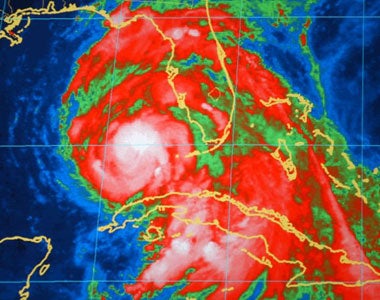A million flee in the US as Dennis kills dozens in rampage through Caribbean

The strongest storm ever recorded this early in the Atlantic storm season, Dennis later weakened to a category 2 (the highest category is 5) but was expected to gain strength as the ferocious system neared the US coast.
Where it will strike is uncertain. But by yesterday, half a million people in coastal Alabama and tens of thousands more in the Florida Keys and low-lying areas of the Florida Gulf Coast were told to evacuate.
Normally busy shops in Key West were boarded up with plywood, and one liquor store had a sign that read: "Dennis Don't Be a Menace."
Many in Dennis's strike zone were aware that it was following almost the same path as Ivan, which came ashore at the Florida-Alabama state line, causing 29 deaths and damage put at $4bn (£2.3bn) in the Panhandle alone.
Cuba was hit hard by Dennis. Huge waves swept away coastal homes as the centre of storm made landfall on the central southern coast early Friday afternoon. Civil defence officials said that more than 1.5 million people left their homes to take shelter with family or friends or in government refuges. Dozens of humble wooden homes in sparsely populated rural areas were flattened into mounds of kindling. Corrugated metal roofs had been ripped off and twisted by the roaring winds, before being scattered across the countryside.
As the storm passed east of Havana, waves up to 10 feet high crashed over the city's seawall. Fierce gusts of wind tore huge chunks of concrete off dilapidated colonial buildings and shattered glass globes from antique street lamps in the old part of the city. The electricity was shut off before the storm reached the city of 2 million to prevent injury from fallen power lines. Huge waves flooded, and in some cases swept away, coastal homes. Fallen trees and utility poles littered roads.
An 18-day old baby was among the 22 reported to have died in the storm, which President Fidel Castro described on state television as a "diabolical force".
In Granma Province, 15,400 of the 20,000 homes in one area were destroyed or damaged, with television pictures showing rows of clapperboard houses flattened by the storm. Strong winds and surf also buffeted Guantanamo Bay on the island's eastern end, where a guard tower was washed into the sea. There were no reports of casualties.
Hours before reaching Cuba, Dennis had struck Haiti and killed 15 people as it brought down bridges, triggered landslides, inundated homes and blocked roads with downed power lines and trees. Young Haitian men were charging $2 to carry travellers and their possessions across the Grand Goave River, which overflowed and destroyed a 300ft bridge, cutting off Haiti's southwestern peninsula. Haiti's Chief of Cabinet, Michel Brunache, said on Friday that five people died on the collapsed bridge, and others were reported missing. At least four people died in the southern town of Jacmel, and another person was killed by a falling tree.
In Jamaica, a rescue helicopter was to airlift food and emergency supplies to hundreds of stranded islanders in at least seven eastern towns cut off by knee-deep floodwaters, said Nadene Newsome, spokeswoman for the country's emergency management office.
"Flooding has affected every parish of the island and it will increase as long as the rain continues," she said.
Forecasters predict the storm, will hit the US anywhere from Florida to Louisiana by today or Monday, the fourth storm in as many weeks to disrupt oil production - one of the factors that drove US crude prices to a record of just under $62 a barrel earlier this week.
The lower Florida Keys, including Key West, were on hurricane warning, while the southern part of the state were on tropical storm warning. A hurricane watch was also issued for parts of the northeastern Gulf Coast.
It's the first time the Atlantic hurricane season had four named storms this early since record-keeping began in 1851. The season runs from 1 June to 30 November. Last year, hurricanes Charley, Frances, Ivan and Jeanne tore through the Caribbean with a collective ferocity not seen in years, causing hundreds of deaths and damage running into billions of dollars.
Subscribe to Independent Premium to bookmark this article
Want to bookmark your favourite articles and stories to read or reference later? Start your Independent Premium subscription today.

Join our commenting forum
Join thought-provoking conversations, follow other Independent readers and see their replies